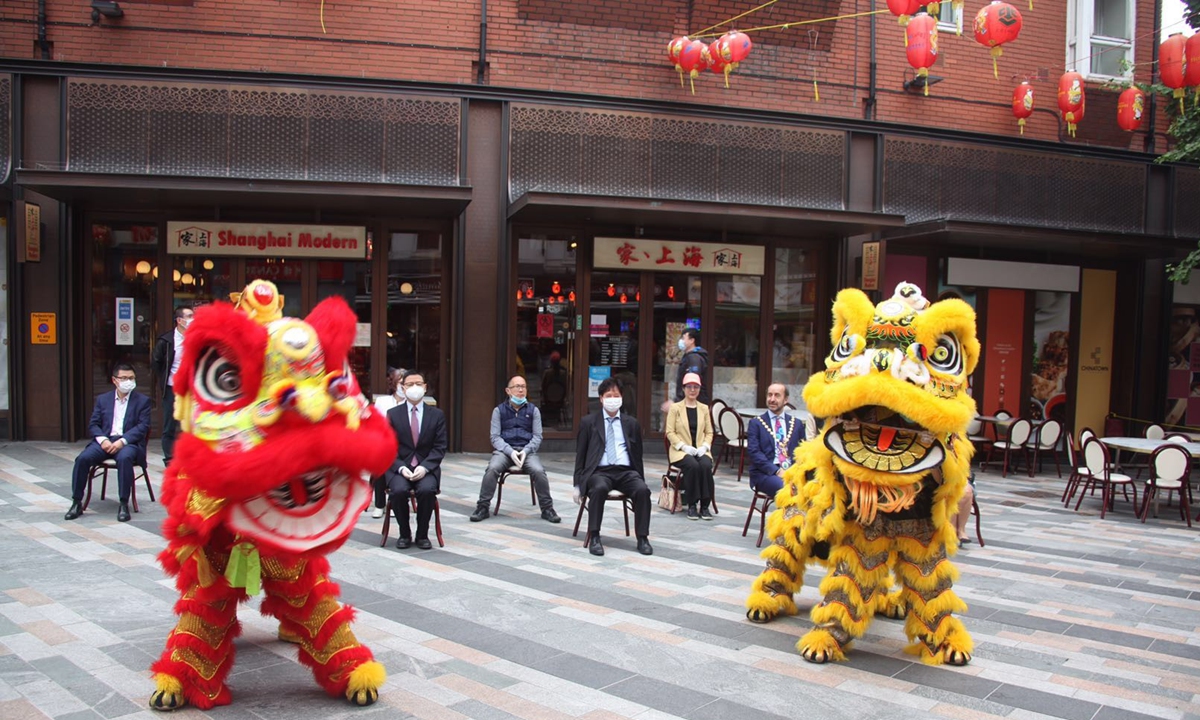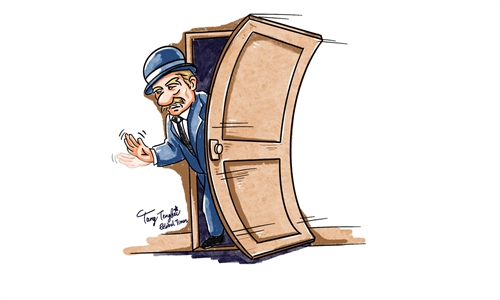
A lion dance is performed on Super Saturday, as part of the reopening ceremony at London’s Chinatown on July 4, 2020. Photo: Courtesy of the Zhejiang UK Association
London's Chinatown is reopening as London reawakens after three months of lockdown.
About 30 percent of restaurants in London's Chinatown opened on "Super Saturday" on July 4, when England's bars and restaurants were allowed to open again for the first time in months, according to Lawrence Lee, spokesman for London's Chinatown. Lee said that by the end of August, over 80 percent of restaurants will have reopened.
The largest Chinatown in Europe and one of London's major tourist attractions, the area has been hard hit by COVID-19. At the reopening ceremony, local businesses handed out free masks, sanitizers, protective equipment and discount vouchers to visitors. Following the British government's guidelines, the event aimed to reassure customers that it is safe to return to restaurants and supermarkets in Chinatown.
"It is still far from being back to normal unless visitors are coming back to Chinatown," Peter Ren, chairman of the British Chinese Entrepreneur Club, told the Global Times on July 12, adding that unless international travel recovers, Chinatown will not be fully back to normal before the end of this year.
Hard-hit but resilient
Chinatown was having a hard time even before the lockdown started on March 23 in the UK. Some members of the British Chinese Entrepreneur Club said that revenue had fallen by half or two thirds compared to the same period last year.
In fear of the COVID-19 outbreak in China in late January, visitors were staying away from restaurants and supermarkets in Chinatown.
Steven Xiong, owner of Rice Coming restaurant, told the Global Times that Chinatown has been losing its vitality since late January due to the lack of customers.
Xiong explained that the main groups of customers are tourists, international students and local Londoners, the majority of whom are not yet coming back.
There are much less international tourists visiting London due to the significant reduction of international flights. International students, especially Chinese overseas students, have not been dining out in order to avoid risks since late January. And local Londoners who normally go to Chinatown before or after enjoying a West End theatre show, now don't have such an incentive as all the theatres are closed.
Xiong added that the number of visitors to his restaurant in the first week after reopening was far below his expectations, even though he had already reduced the number of staff.
The once buzzing atmosphere in Chinatown seems like a distant memory. "There's a long way to go before Chinatown can return to its pre-pandemic level," he said.
Deng Zhuting, president of the London Chinatown Chinese Association, said businesses in Chinatown have suffered considerable financial losses and various difficulties. However, many are simply dealing with the difficulties and are still contributing to the local communities.
Some businessmen changed their restaurants or offices into warehouses and distribution centres for personal protective equipment (PPE) for donations to NHS Hospitals, care homes and GP surgeries across the UK.
The London Chinatown Chinese Association, together with the Zhejiang UK Association, have spearheaded the "We Care NHS" initiative and managed to raise 870,000 yuan ($124,298) from more than 100 Chinese community groups and individuals. The initiative delivered 30,000 medical gowns to the Guy's and St Thomas' NHS Foundation Trust in London in April.
Councillor Jonathan Glanz, Lord Mayor of Westminster, praised the efforts of The London Chinatown Chinese Association, as both Chinese communities and Westminster have joined together in the fight against the coronavirus.
Survival strategy
The reawakening of the UK is long-awaited good news for Chinatown, but there are concerns about a second wave of the coronavirus and the recovery of business.
Peter Ren is cautiously optimistic about the reopening. "If everything is under control and there is no second wave of COVID-19 infections as restrictions ease in the UK, we can expect a better recovery," Ren told the Global Times, adding that things could get better when the British government's new eat out to help out discount scheme is in place in August.
British Chancellor Rishi Sunak revealed last Wednesday in the government's mini-Budget that everyone in the UK will be able to eat out for half the price thanks to the new voucher initiative, which is intended to protect the hospitality sector. The discount will be valid throughout August to help pump cash back into the struggling high street.
Thanks to the coronavirus furlough scheme, which is set to run from March 1 to September, many companies in Chinatown can furlough employees rather than fire them. The government pays up to 80 per cent of people's wages, up to a maximum of £2,500 ($3,156) per month.
"Without the scheme, many restaurants would find it difficult to survive," Ren said.
Among these uncertainties, Ren believes that the lifestyle people have been familiar with has changed. "I have downloaded several online applications for deliveries and take-away orders, which I wouldn't do before the pandemic."
Xiong agreed that online business will play a much larger role in the post-pandemic Chinatown.
Xiong has been organizing donations throughout the coronavirus epidemic. While helping overseas Chinese students in the UK to get facemasks and gloves from China, he realized that many students were in great need of food and daily essentials.
Xiong was inspired to move his restaurant online and develop an applet platform on WeChat for fresh food deliveries and takeaway orders. The applet platform has been quite a success, as it attracted 1,500 customers to register in its first week. Xiong plans to work with other partners to diversify his business.
The government's favorable policies may help businesses survive in the short term, but people will need to find their own way out of the difficulties in the long term, Xiong added.

